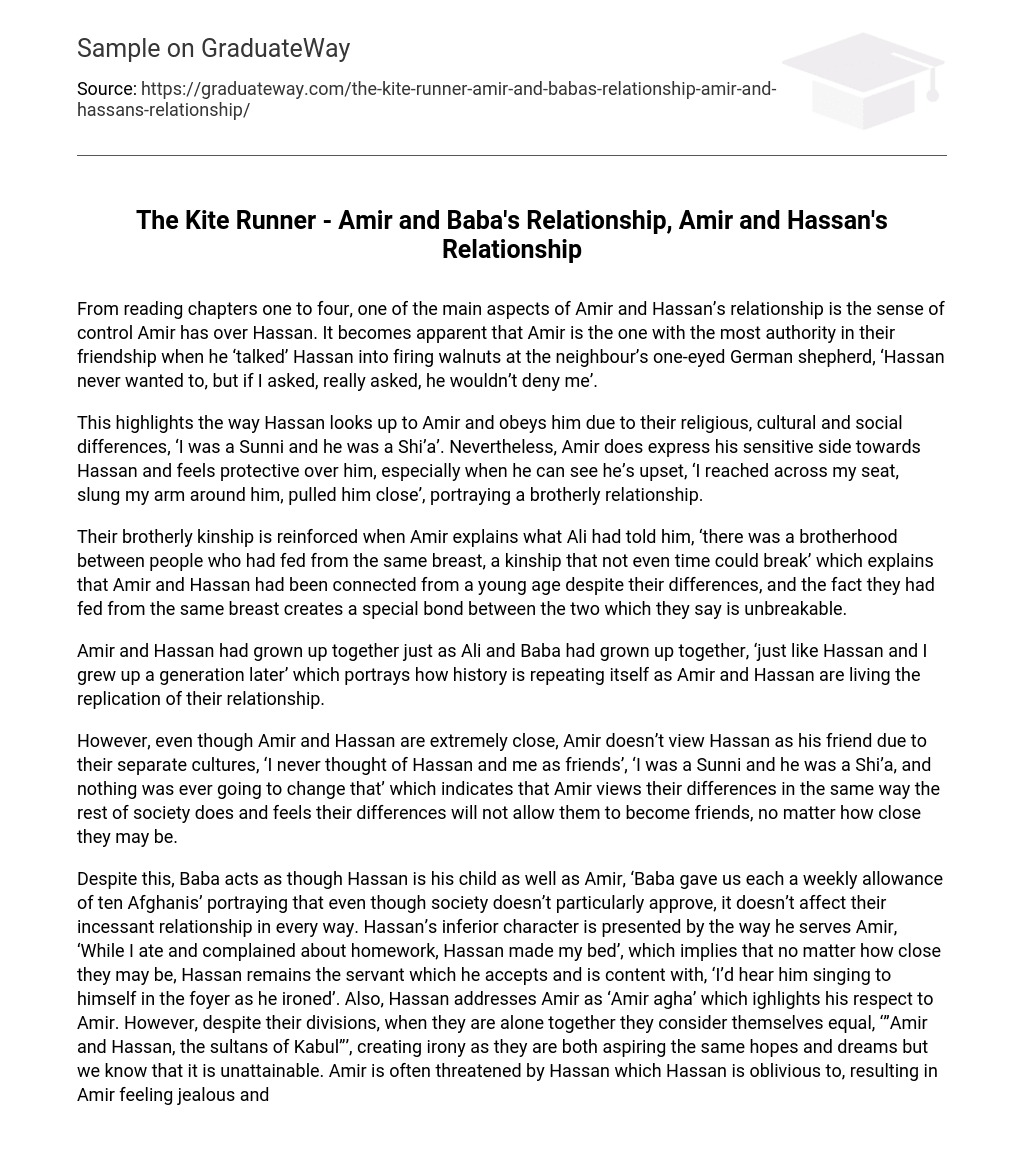From chapters one to four, it becomes evident that Amir possesses a significant level of control over Hassan in their relationship. This is exemplified when Amir persuades Hassan to shoot walnuts at their neighbor’s dog, despite Hassan’s initial reluctance. The quote “Hassan never wanted to, but if I asked, really asked, he wouldn’t deny me” perfectly captures Amir’s superior authority.
The religious, cultural, and social differences between Hassan and Amir are emphasized in their relationship. Hassan, being a Sunni, looks up to and obeys Amir, a Shi’a. Despite these differences, Amir shows sensitivity towards Hassan and becomes protective when he sees him upset. This interaction portrays a brotherly bond between them.
Their brotherhood is strengthened when Amir recounts Ali’s words: “there was a brotherhood among those who were nourished from the same breast, a connection that even time could not sever.” This elucidates the profound connection between Amir and Hassan, despite their disparities. The shared experience of being breastfed establishes an indelible bond between them, one they claim to be invincible.
Amir and Hassan, like Ali and Baba, grew up together. They are living a replication of their relationship that mirrors the historical connection between Ali and Baba. “Hassan and I grew up a generation later,” which highlights the repetition in history.
Although Amir and Hassan have a strong bond, Amir does not consider Hassan his friend because of their different cultural backgrounds. He states, “I never thought of Hassan and me as friends” and explains that their Sunni and Shi’a differences are seen by society as barriers to friendship, which in turn influences his perspective. Amir believes that these differences will prevent them from becoming friends, regardless of their close relationship.
Despite societal disapproval, Baba treats Hassan as his own child, evident in the weekly allowance he provides for both Amir and Hassan. This solidifies their unyielding bond, undeterred by external judgments. Hassan’s subservient nature is demonstrated through his acts of service towards Amir, like making his bed, showcasing his acceptance and contentment in fulfilling this role. This is further exemplified by his singing and ironing in the foyer. Additionally, Hassan’s respectful address to Amir as ‘Amir agha’ highlights his high regard for his friend. However, despite their different social statuses, they consider themselves equal when alone, humorously dubbing themselves as “the sultans of Kabul.” They share common aspirations and dreams, albeit unattainable. Amir’s jealousy and misuse of authority over Hassan stem from feeling threatened by him, though Hassan remains oblivious to this dynamic. Amir admits to discontinuing his own efforts in solving complex problems upon realizing Hassan’s superior abilities.
Amir’s jealousy towards Hassan escalates to the point of abuse, as he takes advantage of Hassan’s illiteracy to discredit him with his intelligence. Hassan acknowledges this, stating, “When it comes to words, Hassan is an imbecile.” Amir, however, experiences guilt for his actions and attempts to make amends by offering him old shirts or broken toys, believing it is enough to rectify his harmful behavior. This demonstrates Amir’s malicious treatment of Hassan. Thus, the relationship between Amir and Baba is tarnished by such actions.
From the beginning, we can observe the absence of familial bond between Amir and Baba due to Baba’s neglect towards Amir. The quote, ‘He’d close the door, leave me to wonder why it was always grown-ups time with him,’ demonstrates Baba’s indifference towards his son. As a result, Amir experiences a sense of loneliness, longing for recognition from his father whom he greatly admires. Nonetheless, Amir discloses that he recognized early on that there was no inherent connection between himself and Baba. In his own words, ‘I’m in his arms, but it’s Rahim Khan’s pinky my fingers are curled around,’ revealing a stronger bond with Rahim Khan rather than with Baba.
Their synthetic relationship between father and son is evident when Baba refuses to listen to Amir and shows no interest in what he is saying to him. The text states that Baba ‘grunted’ and didn’t provide an answer, illustrating his ignorant behavior and indicating that he has no interest or time for his son. Due to Baba’s indifference, Amir feels compelled to say unpleasant things in an attempt to capture his father’s attention. Even when Amir claims to have cancer, Baba remains unaffected and misunderstands him, responding with a comment about fetching his own soda.
Despite being aware that Baba does not listen to him, Amir deeply admires his father and considers himself fortunate to have such a distinguished figure as Baba. “He motioned to me to hold his hat for him, and I was glad to do it because it showed everyone that he was my father, my Baba.” However, alongside his longing for love and attention from Baba, Amir also fears him and struggles with how to act when Baba does give him attention. “I couldn’t decide whether I wanted to hug him or jump off his lap in mortal terror.” This emphasizes the profound distance in their relationship, as Amir is uncertain of how to respond to his father.
The distance between Baba and Amir is emphasized by Baba’s impatience and inability to deal with a child’s natural immaturity. Baba’s harsh words, questioning Amir’s ability to handle a mature conversation, cause Amir to feel insecure. The infrequency of Baba speaking to him, particularly while Amir is sitting on his lap, leads him to regret missing this opportunity. Amir believes he is failing to meet his father’s expectations and punishes himself as a result.
Amir believes that his father’s lack of time spent with him is due to the belief that Amir is responsible for his mother’s death. Amir carries a sense of guilt and punishes himself as a result. He longs to emulate his father, but instead grows more bitter and resentful towards Baba’s dismissive treatment. Baba even admits feeling disconnected from Amir because of their dissimilarities, stating, “If I hadn’t seen the doctor pull him out of my wife with my own eyes, I’d never believe he’s my son.”





